
 Flash News
Flash News
Counting ends in Kukës district, DP wins 2 mandates
Egnatia is declared champion of Albania, ending Vllaznia's 24-year dream
DP leads in Kavaja against SP
Financial Times / Rama wins fourth term: the creation of a cosmetic pluralism is at risk
Neither PS, nor DP/ In Vau i Dejës, Tom Doshi's party is declared the leading force
BIRN: Multiple sclerosis patients in Albania suffer from limited access to medicines

Etleva* was just 20 years old when she was diagnosed with an incurable autoimmune disease called Multiple Sclerosis. In 2001, while she was a student in Italy, she ended up in the hospital due to severe headaches, numbness on one side of her body, and several episodes of loss of balance.
The news he received from the doctors was shocking.
"My eyes went dark, I withdrew into myself, and it took me a long time to get used to this illness, which appeared to me from time to time," recalls Etleva, now 44 years old.
Etleva's struggles with the disease worsened after returning to her homeland, where she was treated for several years with Interferon – the only medication available to multiple sclerosis patients in Albania at the time. But the Interferon lost its effect on her body and there were no other medications available.
Etleva told BIRN that she went without medication for many years, before doctors gave her a new medication in 2021, which caused liver problems.
“Since then, I haven’t taken any other medication, they don’t recommend it, because the doctors say I’m fine,” Etleva told BIRN. “I’m basically confined to my house because I can’t move, I lose my balance and I get tired easily,” the worried patient added.
Multiple sclerosis is a chronic autoimmune disease that attacks the nervous system, causing muscle weakness, vision problems, loss of balance and even disability. The disease is mainly diagnosed between the ages of 20-40, but in rare cases even in minors.
For the Albanian healthcare system, multiple sclerosis has a low prevalence and is not considered a problem. But hundreds of diagnosed patients in Albania live with the drama of denied or delayed treatments, which endanger their health and quality of life.
According to Tanush Çaushi, president of the "Tree of Life" foundation for patients with multiple sclerosis, the lack of medications and treatment protocols over the years has led to a deterioration in the health of many people suffering from this disease in Albania.
Çaushi also expressed concern that the health system manages to treat only 10% of patients, while necessary physiotherapy services and psychological treatments are still not covered by the state.
“Many sick people have been forced to flee the country for treatment, as they have not been able to receive it in Albania,” he told BIRN.
The Ministry of Health claimed in a written response that it followed international protocols for the diagnosis and treatment of patients with multiple sclerosis, while including several innovative medications for the treatment of the disease in the list of reimbursable drugs.
"Consultations, diagnostics and drug treatment are determined by a team of 6 doctors, three seniors and three residents. A commission of 3 doctors at the university Neurology service at QSUNT evaluates the patient's progress in dynamics in relation to treatment with reimbursable and hospital drugs," said the Ministry of Health.
Unpredictable disease
The detection and treatment of multiple sclerosis has been an ongoing challenge for scientists and neurologists since the early 19th century. Hundreds of therapies were unsuccessfully tested on affected people around the world, before patients with recurrent episodes were treated with cortisone in the early 1950s.
In Albania, the first medication to treat the consequences of the disease was introduced in 2000 and remained unchanged for almost two decades, despite the progress of science and the approval of new medications.
The country also lacks a national registry of multiple sclerosis patients, making their numbers unclear. The Ministry of Health did not provide BIRN with the total number of patients, but only data from 2024, according to which a total of 210 cases were followed.
Meanwhile, the "Tree of Life" foundation counts around 2,000 patients across the country, based on its own studies.
At the Neurology Service at the "Mother Teresa" University Hospital Center, Dr. Jera Kruja, who is also the head of the service, has been treating multiple sclerosis for 45 years, which she calls an unpredictable disease.
"It's an autoimmune disease, there are a lot of unknowns. So you can do everything and the disease can go bad. And someone else who hasn't done anything, goes well," she explains.
According to Kruja, the number of patients nationwide is not very high and she believes the disease is well covered compared to other more common diseases such as epilepsy or Parkinson's. Kruja also said that medication coverage has improved significantly since 2000, when the first treatment for multiple sclerosis arrived in Albania.
"We had the first treatment for this disease in 2000, which was only a few years after it was introduced in Europe. Then we introduced some medications and stayed with them for a few years, while science progressed and came up with new treatments," recalls Kruja, who emphasizes that the situation has changed in recent years.
In the last two years, according to her, the state has reimbursed 100% of seven alternatives for the treatment of Multiple Sclerosis out of 14 such drugs circulating in Europe, including four innovative drugs such as Ocrevus, Mavenclad, Glatiramer Acetate and Cesimta.
But Tanush Çaushi from the “Tree of Life” foundation told BIRN that only a limited number of patients are being treated with the new medications.
"The number of people treated for multiple sclerosis in our country is over 160 patients, while the number of those affected is higher. According to QSUT statistics, there are about 1,000 patients, while according to our studies, there are about 2,000 patients," he said.
Çaushi, 42, was diagnosed with multiple sclerosis in 2015 and says the disease has progressed rapidly, to the point where he can now walk with the help of a walker. He blames the treatment protocol for the disease's progression.
"I've been treated with Interferon for four years, which is why I've gotten so much worse. I asked for another medication, but the hospital told me: we don't have another medication," says Çaushi.
"When I found out there were other medications, it was too late for me. The damage was done," he added.
For the past two years, Çaushi has been treated with Ocrevus, which he receives twice a year in a hospital setting by injection. But he fears that his treatment will be discontinued.
"Recently, I've been told that treatment with this medication is only for two years, while abroad, if it is functional for the patient, the medication is taken for years, even 10 years," he said.
Patients do not have access to medications
Multiple sclerosis treatment medications are extremely expensive, with prices ranging from 2,000 to tens of thousands of euros per unit. According to the Ministry of Health, reimbursable drugs for this category of patients cost 394 million lek [3.9 million euros] for the years 2022-2024.
The drug Ocrevus/Ocrelizumab alone has cost the QSUT 64 million lek during a procurement procedure for the years 2022-2024. However, only a limited number of nearly 20 patients have benefited from this medication during this period.
Other patients BIRN spoke to complain about the lack of medications and their frequent interruption, while they struggle every day with this difficult disease.
Vera Bungu, a 47-year-old from Vora, has been bedridden for years, unable to move her deformed limbs. She was diagnosed 14 years ago, but only started treatment with medication four years ago.
"I can't move my arms or legs, I can't even stand in a wheelchair. Even to eat, my sister-in-law feeds me, since I have no one else," says Vera.
Currently, she is being treated with Vitamin C, Lioresal, a muscle relaxant, and an anti-anxiety medication. She complains that she has not had access to other medications that treat the symptoms of Multiple Sclerosis.
"The hospital told me that there is no medication for Multiple Sclerosis, while my family doctor told me there is, but the hospital doesn't provide it. I thought about going into debt to buy it, but it was about 35 thousand euros a bottle and I can't afford it," she said.
Albana, a 48-year-old from Lezha, has a similar experience. Diagnosed with multiple sclerosis 6 years ago, she has only been treated with Interferon for a year and a half.
"Then they didn't give me any more, they told me to go to your city. I got better, but I had difficulties. It came back again, I can't move anymore, I'm bedridden," complains Albana, who added that doctors in Lezha told her that treatment can only be provided from Tirana.
Blerina*, the daughter of a patient diagnosed two years ago with multiple sclerosis, says they were unable to obtain any medication in Albania despite their efforts, forcing them to move to Italy for her father's treatment.
"At the hospital they told me: my father is old, let him stay like this for once. Seeing the condition that was worsening, the fear of a possible relapse was growing day by day," she recalls.
After obtaining a health card in Italy, Blerina says her father underwent examinations there and was then immediately given medication, along with advice that it should never be discontinued.
“We have spent a lot and taken out loans just to give my father a better quality of life,” said Blerina. “I am disappointed with the treatment in Albania and it is absurd that I can get the medicine faster in Italy than in the country where he has worked for years,” she added.
Greek neurologist Grigorios Nasios, who also treats multiple sclerosis patients in one of the country's private hospitals, told BIRN that Albanian patients are not treated well by the system and called this "a tragedy."
"I personally treat many of them and have encountered difficulties even in accessing medications," Nasios said.
"We never stop treatment. It can happen if the condition is very chronic and cases of secondary progressive disease, but that's only after we've treated it for 20-30 years," he added.
Patients with multiple sclerosis pay out of pocket for medical services related to physiotherapy, mental health, and in severe cases, even the need for nurses and caregivers, as the public healthcare system does not provide or cover these services.
Neurologist Jera Kruja considers physiotherapy as a therapeutic basis, but the possibilities in the service she runs are limited. Kruja says that a few years ago she created a suitable environment for the rehabilitation of patients, but this environment has not been dependent on Neurology for years.
"It's important not only in the hospital, but also very important outpatient," she said regarding physiotherapy.
The "Tree of Life" Foundation has been lobbying for years for patients with multiple sclerosis to benefit from free physiotherapy services, which, according to its president, Tanush Çaushi, are expensive for them.
"We cover all the costs privately. I have to do 3 sessions a week at 25-30 Euros per session. Plus I have to take a taxi to get to the clinic. The costs are unaffordable to do physiotherapy privately," said Çaushi.
According to physiotherapist Fatjon Hajdari, the lack of periodic treatment for patients with multiple sclerosis weighs on their health and quality of life.
"The lack of physiotherapy leads to muscle and joint blockage and makes normal human mobility impossible. If they do not undergo physiotherapy, these patients will only have a deterioration in their physical ability and even limb blockage and bed rest," said Hajdari.
Contrary to what patients say, the Ministry of Health claimed that physiotherapy services were provided free of charge.
"Patients who have a recommendation from a neurologist receive this service at the established socio-health centers that will gradually cover the entire territory according to the 2021-2030 action plan," the Ministry of Health concluded./BIRN
*Names have been changed to protect patients' privacy.
Latest news


Vote counting in Mirdita concludes, DP wins convincingly
2025-05-12 23:40:46
Diaspora vote counting/ Observer - Ballës: Get out, you kicked us out of Albania
2025-05-12 23:27:36
Four almonds a day, 6 direct benefits to the body
2025-05-12 23:15:40
Vllaznia team 'doctor' arrested, dozens of fireworks found in his bag
2025-05-12 23:02:26
Denunciation/Electoral Reward for Noizy
2025-05-12 22:51:44
She won the mandate from the open list in Kukës, here is who Elvira Peka is
2025-05-12 22:38:39
Victory in Kukës, Flamur Hoxhaj: Fruit of the work and program we have done
2025-05-12 22:30:07
Tritan Shehu talks about the election result: Lazarati voted for the DP
2025-05-12 22:30:03
Trump may travel to Turkey for negotiations between Zelensky and Putin
2025-05-12 22:16:46
Counting ends in Kukës district, DP wins 2 mandates
2025-05-12 22:11:27
Egnatia is declared champion of Albania, ending Vllaznia's 24-year dream
2025-05-12 22:03:56


Albanian convict terrorizes prison in Greece, takes guards hostage
2025-05-12 21:36:15
Rama leaves headquarters, does not speak to journalists
2025-05-12 21:26:16
New report, old refrain
2025-05-12 21:18:59
DP gains advantage in Lezha, secures 4 mandates
2025-05-12 21:06:16
DP leads in Kavaja against SP
2025-05-12 20:57:52
In Shkodra, Vllaznia brings together the commissioners of the SP and the DP
2025-05-12 20:43:15
60% of votes counted across Albania, how mandates are distributed
2025-05-12 20:30:56

OSCE-ODIHR Report/ Media in Albania, collaborators of the government
2025-05-12 20:20:13
What would happen to your body if you slept less than six hours?
2025-05-12 20:08:27
Counting closes in Librazhd, how votes were divided between the DP and the SP
2025-05-12 20:02:24

Celibashi: Here's when we can have the final election results
2025-05-12 19:45:19
The May 11 elections, with old problems
2025-05-12 19:37:31
Source: DP should request the annulment of the elections
2025-05-12 19:25:20
From May 15, President Osmani begins efforts to unblock the Parliament
2025-05-12 19:18:39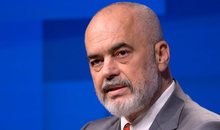

Vllaznia-Egnatia is played today, Shkodra fans arrive at the "National Arena"
2025-05-12 19:03:11
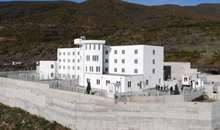
Even in the women's prison, the SP is voted for
2025-05-12 18:44:08
Accident in Laç, 84-year-old man taken to Trauma Hospital
2025-05-12 18:30:36
Counting continues in Tirana, Tabaku: Projection of mandates will change
2025-05-12 18:18:03

The Diaspora vote, a reflection of the elections within the country?
2025-05-12 17:59:12



The DP leads confidently in Fushë Krujë and Kamëz
2025-05-12 17:19:50
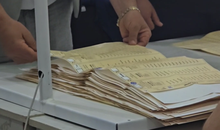


Number of diplomas declining, 9-year education most affected
2025-05-12 16:41:54
Leaving aside votes from Greece, CEC: They will not be excluded from the count
2025-05-12 16:31:53

They photographed ballots, two people are wanted in Tirana
2025-05-12 16:11:52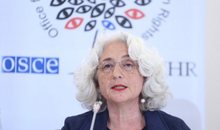

Prisoners choose Rama!? PS wins with 82% in Elbasan detention center
2025-05-12 15:55:19

Austrian tourist, injured in accident on Himara-Borsh road, dies
2025-05-12 15:37:14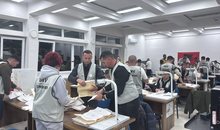
The counting process in Cërrik ends, here's who won
2025-05-12 15:31:20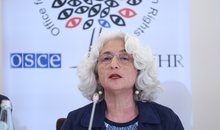

"There are violations!"/ Vote counting halted in CEAZ 17 in Klos
2025-05-12 15:11:41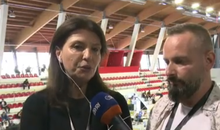


Who are the candidates of small parties who secure a seat in the Assembly?
2025-05-12 14:50:24
The elections were held under political patronage - organizations emphasize
2025-05-12 14:49:37
Berisha warns: The opposition will not turn a blind eye to violations
2025-05-12 14:28:33
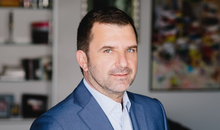
Why did Rama grow up?
2025-05-12 14:11:37



Vote counting in Delvina closes, here are the results
2025-05-12 13:38:57
He is running on an open list, how many votes has Ilir Meta received so far?
2025-05-12 13:20:00



Vote counting in Fier suspended, process resumes tomorrow at 08:00
2025-05-12 12:24:35
Electronic voting results published in Vora, votes for each party
2025-05-12 12:10:03
In such elections, victory can only be Edi Rama's.
2025-05-12 12:01:10
Threatened journalist during duty, 26-year-old faces criminal charges
2025-05-12 11:57:39

The counting process in Himara ends, the Socialist Party wins
2025-05-12 11:49:17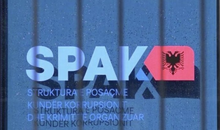
May 11th elections, SPAK: 39 criminal proceedings have been registered
2025-05-12 11:36:25


PSD third political force, what are the chances of the 'small ones' so far?
2025-05-12 11:04:31
Counting ends in Rrogozhina, SP emerges as the leading force
2025-05-12 10:50:30
Counting ends in Tepelena, Socialist Party wins
2025-05-12 10:45:23
Counting ends in Memaliaj, Libohova and Këlcyrë, here's who's leading
2025-05-12 10:28:23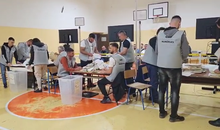
Mirditë/ DP leads over SP, how many votes have they received so far
2025-05-12 10:23:30
Spain makes decision, shortens weekly working hours
2025-05-12 10:10:30

Threats for a vote, the party's deputy chairman under investigation by SPA
2025-05-12 09:53:18
The DP-ASHM coalition leads in Kavaja
2025-05-12 09:47:41
DP-ASHM leads in Kukës after counting 71 ballot boxes
2025-05-12 09:31:26
BIRN: Organized crime “oriented” the vote in Durrës
2025-05-12 09:24:39

Counting ends in Kolonjë, who is leading?
2025-05-12 09:00:13

Counting ends in Pustec, SP leads
2025-05-12 08:41:21
First diaspora votes counted, DP-ASHM leads by a narrow margin over SP
2025-05-12 08:38:13

DP leads in Kukës, over 3 thousand votes ahead of SP
2025-05-12 08:16:02
First ballot boxes counted, DP-ASHM leads in Kruja
2025-05-12 08:04:38
